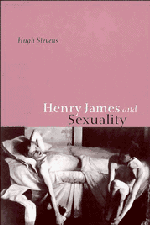Book contents
- Frontmatter
- Contents
- Preface
- Acknowledgements
- List of abbreviations
- 1 Henry James and the languages of sex
- 2 Gender and representation in The Wings of the Dove
- 3 Sexuality and the aesthetic in The Golden Bowl
- 4 The eroticism of prohibition: masochism and the law in Roderick Hudson
- 5 Queer plotting: The Bostonians and The Princess Casamassima
- 6 James's late short fiction and the spectacle of modern homosexuality
- 7 Suicide and blackmail: James's ‘poor sensitive gentlemen’
- Conclusion: ‘that queer monster the artist’
- Notes
- Bibliography
- Index
7 - Suicide and blackmail: James's ‘poor sensitive gentlemen’
Published online by Cambridge University Press: 28 October 2009
- Frontmatter
- Contents
- Preface
- Acknowledgements
- List of abbreviations
- 1 Henry James and the languages of sex
- 2 Gender and representation in The Wings of the Dove
- 3 Sexuality and the aesthetic in The Golden Bowl
- 4 The eroticism of prohibition: masochism and the law in Roderick Hudson
- 5 Queer plotting: The Bostonians and The Princess Casamassima
- 6 James's late short fiction and the spectacle of modern homosexuality
- 7 Suicide and blackmail: James's ‘poor sensitive gentlemen’
- Conclusion: ‘that queer monster the artist’
- Notes
- Bibliography
- Index
Summary
1 SUICIDE AND COMIC SPECTACLE
According to two homosexual polemicists from the turn of the century, young homosexual men frequently killed themselves, whether from low self-esteem or because of concrete social pressures, such as blackmail or the fear of prosecution. The Criminal Law Amendment Act of 1885 was known as the ‘blackmailer's charter’, yet more than the fear of specific legal punishment feeds into the dread inspired by the approach of the man who knows too much. For the late nineteenth-century gentleman who does not constitute himself as queer, the bearer of shady secrets threatens much, including marriage or other heterosexual relationships, social standing and professional status. J. A. Symonds wrote in ‘A Problem in Modern Ethics’ (1891) that ‘many unexplained cases of suicide in young men’ can be accounted for by homosexuality, and ‘Xavier Mayne’ (Edward Irenaeus Prime Stevenson), in his study The Intersexes (1908, but written over the previous two decades), describes a virtual epidemic of homosexual suicides: ‘uranianism’, he writes, ‘has a long yearly chronicle of murders that are – self-murders’.
As Xavier Mayne's melodramatic tone suggests, queer suicides could be luridly sensationalized, and provided fertile ground for fictional treatment. Consider a number of fictional representations of young men who have taken their own lives, usually at the close of the novel, anticipating the popular films which reserved a nasty fate for their queer characters in the last reel.
- Type
- Chapter
- Information
- Henry James and Sexuality , pp. 145 - 163Publisher: Cambridge University PressPrint publication year: 1998



